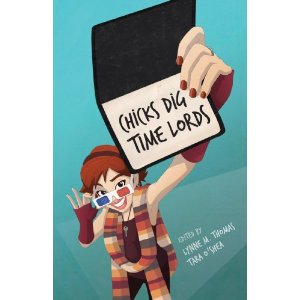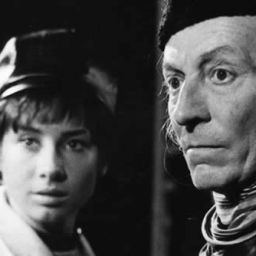
Hardcore fans may either be bored or delighted by the first few essays that cover similar ground, exploring how many of the writers discovered Doctor Who and became a part of the fan community. For most U.S. fans, it’s some variation of the same story, discovering the old Tom Baker episodes on PBS or coming into the fandom through Russell T. Davies 2005 relaunch. The personal essays that broke from that mold explored the powerful connection that shared fandom can create between family members, such as “Time is Relative,” Carole Barrowman’s essay on her shared lifelong Who fandom with her brother John (yes, *that* John) or Amy Frisch’s “Two Generations of Fangirls in America” who talked about passing down her love of Doctor Who to her daughter.
Being a Doctor Who fan, but not an active fangirl*, I found the essays that focused on fan activity (zines, cons, cosplay, etc.) interesting, but I’m sure a more engaged fan would find these essays to be a highlight. Few fandom-focused books get into the nitty-gritty of fan activity, preferring to not alienate more casual fans with “insider talk” so the benefit of being published by a small niche press is not having to worry about that issue.
The more academically focused essays of the anthology were both my favorite section of the book and the most disappointing: there’s so much to be explored and interrogated in terms of gender (and race, and sexuality, and class and culture) with the show, and the essays would get close, and then end before they got meaty. Case in point, the essay “Martha Jones: Fangirl Blues” presented some provocative thoughts about race on Doctor Who but seemed more like the start of a much longer essay that explored Martha within the context of Who’s whitewashed history and the fandom’s collective response and reaction to issues of race. One essay that got close was “Two Steps Forward, One Step Back” which took at hard, hard look at the new series and whether its portrayals of gender and sexuality are as enlightened as some give it credit for.
I don’t think the intent Chicks Dig Time Lords was to be that kind of book, or focus on that kind of writing, however, it’s meant to give a platform to fans across the spectrum who have a lot of insight that may not be covered or respected in more traditional academic cultural studies writing, and I appreciate that.
It has also been interesting and refreshing to observe Doctor Who’s evolution from one of the more obscure (and presumed male-dominated) of sci-fi fandoms in the U.S. to a relatively mainstream fandom that is now often seen as hip and even kind of sexy, particularly with younger female fans coming into the fold. But often these fans are still seen as outliers or interlopers. Small press, fandom-focused books like Chicks Dig Time Lords go a long way in amplifying those once-peripheral fandom voices just a little bit more.
*I’m an old school Who fan, but no fangirl on the level of spending hours actively participating in cons, online communities and such. I am one of THOSE people that watched old school reruns on public TV as a little kid, Tom Baker was my first Doctor and always will be MY Doctor. When I was sick in sixth grade and couldn’t participate in gym for a whole year, I spent Monday mornings talking about episodes with my teacher. I always saw Doctor Who as an exciting escape from my boring childhood world. As I got older, my interests moved on to other things but my affection of Doctor Who always remained, and I would defend it again other geeks who derided the show with the worst insults you could bestow upon a TV show at the time, like “cheesy,” “cheap,” and “British.”


